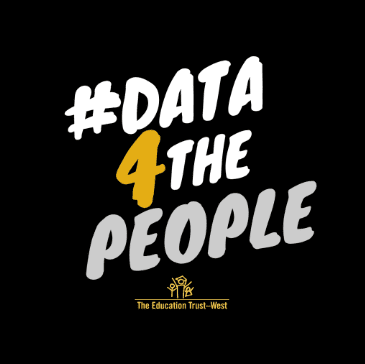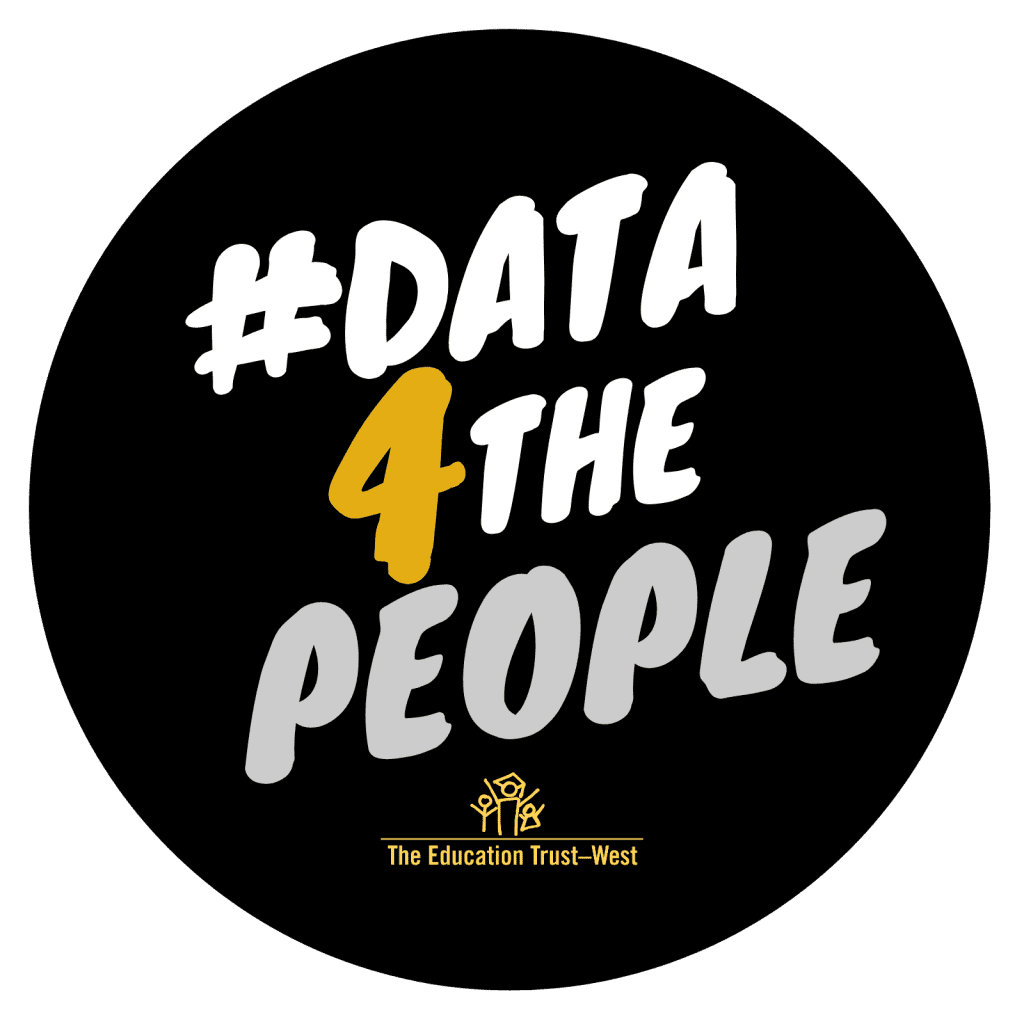Education Equity in Crisis: #Data4ThePeople but How?
For over 5 years, The Education Trust–West’s #Data4ThePeople campaign has been a statewide effort to ensure California builds a data system that is designed with achieving equity and the needs of students, parents, and families at the center.
Now with school and college closures caused by COVID-19 posing a real challenge to data accessibility and quality, state and education leaders are urged to find workable solutions. Data is critical to ensuring communities and educators are empowered with the best information to highlight inequities and demand educational justice for California’s schools and colleges.
The latest resource in our Education Equity in Crisis series, called “#Data4thePeople but How?” aims to highlight the real impact of school and college closures on data. While it’s not possible to adequately collect data at this time, it is possible to understand the current limitations and find workable solutions to ensure useful data is collected in a timely fashion.
Recommendations for state and education leaders
- Immediate collaboration across education entities to provide comprehensive understanding of student experiences.
Given the pandemic and its impact on communities, the California Department of Education (CDE), governing offices for all California systems of public higher education (CCC, CSU, UC), and the Employment Development Department (EDD) should commit to publicly release annual disaggregated “to and through” data on the postsecondary pathways of current students. This includes college matriculation, persistence, and completion, as well as, wage and employment data, in order to determine how students impacted by the pandemic fare compared to prior cohorts and identify additional interventions and supports if needed. This data should be accessible to the public through each entity’s primary data dashboard. - Continued support for the Cradle-to-Career Data System.
The Education Trust–West, through the Data for The People Campaign, strongly advocates for more data in order to address equity issues and we believe this to be necessary in understanding the true impact of school and college closures due to COVID-19 on institutions, students, and their families. Establishing a statewide longitudinal data system (SLDS) gives all sectors (e.g., K-12, higher education, state) the opportunity to leverage their resources to support each other and to not only better understand the true impact of closures, but to understand how to support students moving forward. Despite pressure on the state budget, it is critical to protect the one-time funding allocated for the development of the Cradle-to-Career Data System and appropriate future funding. When it is fully operational, this system will be a valuable tool in identifying the state’s biggest disparities regarding learning loss and measuring the effectiveness of strategies for recovery for preschool through post-secondary students. - Revisit protocols for identifying schools and districts for differentiated assistance.
Instead of seeking to waive the requirement to identify schools for differentiated assistance, the CDE should develop a new plan to identify schools in need of this support. The availability of previously used metrics may be limited, but CDE should work with school leaders to identify new criteria to be used for determining which schools need the support for their students during this difficult time. This can include developing metrics specific to the current pandemic and school resources, such as access to technology for distance learning. - The state should provide guidance and resources for schools and colleges.
The state should collaborate with leaders of all P-16 educational systems (i.e., CDE, UC, CSU, CCC) to develop clear guidance and “common practices” of what schools and colleges can move forward in the absence of data. This will include support on how schools and colleges can best make critical decisions during this time, while keeping the state’s most vulnerable students in mind. Additionally, this creates an opportunity to establish new COVID-19 specific data metrics that can be collected across all systems. Our recent equity alert provides recommendations on how to ensure this crisis does not widen opportunity gaps for our vulnerable students, which should be taken into consideration in the state’s guidance around data and decision-making. - Encourage postsecondary institutions to collect more data.
In addition to annually collected data, postsecondary institutions should identify and collect metrics specific to the experiences of students during this period. Under guidance from the state, all public systems of higher education should convene and agree on metrics specific to this crisis that should be uniformly collected across all systems. As colleges try to understand the impact of campus closures, it is imperative that they be intentional about collecting data specific to this current crisis. This will be helpful in learning to actively support students, as well as inform early warning indicators for institutions to use in the future. The new metrics should include data on the impact of housing closures, impact of financial aid loss for students, impact on outcomes and workforce implications, among others. - CDE should release a revised version of the CA School Dashboard.
While CDE was granted a federal waiver from ESSA and is no longer required to release 2020 state indicator data, CDE should consider releasing a revised version of the dashboard containing any available data for each indicator. This should not be linked to any direct accountability implications, but rather serve as a resource for schools, students and families to get a sense of how their schools fared during this time. Since full-year data will not be available for all indicators, CDE should work closely with LEAs to identify best approaches for using any available data, with the explicit clarification that it is not complete data. For example, using suspension rates up to school closures.

Learn more about our COVID-19 education equity-centered resources and responses.

Learn more about the #DataforthePeople Campaign.

Find out more about ETW’s Equity 8 – Legislative Principles Amid COVID-19 pandemic.


